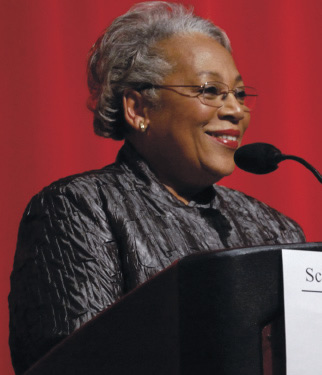EIRNS/Stuart Lewis
Mezzo-soprano Elvira Green: “The culture of Classical music is truly alive and well.”

Home >
 |
 EIRNS/Stuart Lewis Mezzo-soprano Elvira Green: “The culture of Classical music is truly alive and well.” |
Elvira Green is a mezzo-soprano, formerly with the Metropolitan Opera. She is currently serving in her eighth year as an artist in residence at her undergraduate alma mater, North Carolina University.
I am so happy to be here this afternoon, to share a few moments of the legacy of an incredible human being. There are two females who have occupied this planet that have made me who I am today. One is my grandmother, Elvira Katherine Pennington Watson, and the other is Sylvia Olden Lee. Permit me to read a little something to you-my tribute to Sylvia Olden Lee, on the occasion of the honor being bestowed upon her by the National Opera Association.
"History is recording, as we speak. A master musician, a diminutive woman, with orchestral fingers, a symphonic intellect, and a real live genie. Performers of all the music statures who have been honored to study with Mrs. Lee, do know who the consummate artist is. There will never be sufficient vocabulary to express my thanks to her, for giving me the operatic and classical tools with which to create an inexhaustible array of characters. There is no more gratifying response to my performances, as when the comment is made, 'Ah, you've worked with Sylvia Lee.' "
Mrs. Lee asked me one morning-she didn't ask you, she just simply said, "This is where we're going in; this is what you're going to do." And so she invited me to come with her to a meeting of this incredible institution [the Schiller Institute], to talk about the National Conservatory of Music. It was then, for me, a wonderful opportunity to open my horizons, and to continue to open my horizons into what it is that music is about, in terms of a culture, in terms of what it means when people hum to themselves, in terms of what it means when people take the time to get dressed, or maybe not to get dressed, to go to a performance of any nature-cultured, or rather uncultured, to learn some culture. We can do that as well.
What she led me to understand was, that this world of Classical music, has no one name, nor 100,000 names. It is the music of the world, created by a world of people. And I would like to just maybe take three or four more minutes, to talk to you about my world of people, as an advocate for young people in the arts.
I have travelled around the world many, many times, including with the Schiller Institute, to perform with children in all walks of life, in all living situations. We were in one small town and visited a children's foundling home-and there was a tiny little girl who heard music, and she found herself in the room with us, and her father immediately came and literally took her by the arm, and snatched her out of the room. She didn't cry. When he released her, she came back. He did it a second time. She still didn't cry. He released her-she came back. And he came with her, and all she sang was, "Mary had a little lamb, little lamb. . ." She had heard us sing nursery rhymes for about five minutes. I don't know what language she spoke, but it didn't matter. It was the language of music.
And that's what we do for young people. I have been dealing with this particular aspect of music, the Classical arts, for more than 20 years, running a Summer opera program for 7-17 year olds. They're in for three weeks; they not only learn to sing an opera, but they learn to act. They learn to sing in English, French, German, Italian, Spanish, Russian-I do speak a little bit of everything. And they don't know the first day that they come in, that they're going to learn to sing opera. They learn the stories. They meet each other. They talk about where they came from, and they play together in a beautiful world where the culture of Classical music exists.
At the end of the day, they have written in their journal, "We can't wait to come back tomorrow."
I find that the culture of Classical music is truly alive and well. And why do I find that so? Because I insist that that is what it is. And that is what the young people with whom I have worked all these years, some of whom have grown, have become international opera singers, or cultural entrepreneurs in the world of music, or film, or oratorios-of all of those opportunities that they share their culture in music, their understanding of what it is to say, "I sing opera; I sing recitals; I sing Handel and Mozart and Dvorak, and William Grant Still," and all of those wonderful things.
We love music. And we love Classical music. And with that. . .
[She concluded by singing the Negro Spiritual "I am a Pilgrim of Sorrow."]